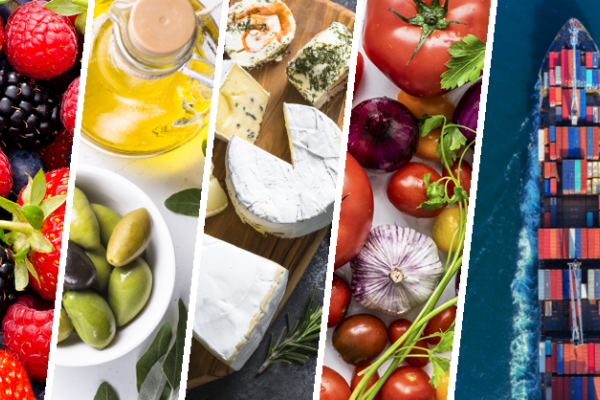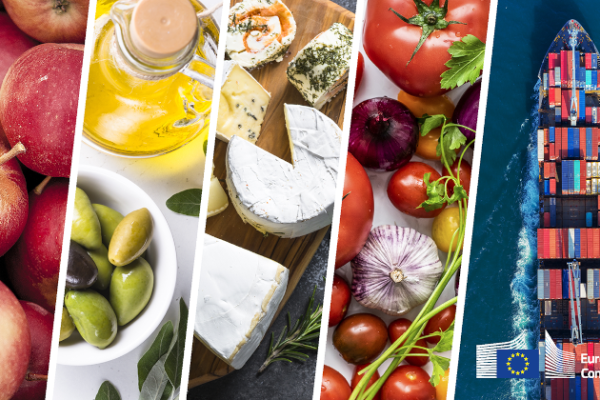CAP in the EU budget
The EU’s multiannual financial framework (MFF) for 2021-27, adopted on 17 December 2020, amounts to €1.21 trillion (in current prices) with an additional €808 billion from the next generation EU recovery instrument. The total allocation for the common agricultural policy (CAP) amounts to €386.6 billion, divided between two funds (often referred to as the “two pillars” of the CAP):
European agricultural guarantee fund (EAGF)
The EAGF (the “first pillar” of the CAP) has an allocation of €291.1 billion. Up to €270 billion will be provided for income support schemes, with the remainder dedicated to supporting agricultural markets.
European agricultural fund for rural development (EAFRD)
For the EAFRD (the CAP’s “second pillar”), the total allocation amounts to €95.5 billion. This includes €8.1 billion from the next generation EU recovery instrument to help address the challenges posed by the COVID-19 pandemic. Around 30% of the recovery funds have become available in 2021, with the remaining 70% released in 2022.
During the first two years of the 2021-27 MFF, the CAP allocations were implemented under the transitional regulation, adopted on 23 December 2020, ensured a smooth transition to the CAP Strategic Plans, the implementation of which started on 1 January 2023
The CAP strategic plans allow for a greater degree of flexibility between the two funds and include the ambitions of the European Green Deal, in particular the Farm to Fork Strategy. Overall, 40% of total CAP expenditure is to be dedicated to climate action.
Under the CAP Strategic Plans, the funding objectives of the CAP remain the same, but more specific objectives reflecting the issues at stake for the agricultural sector and rural development of the European Union have been defined. The CAP strategic plans are built around the following nine specific objectives (SO):
- SO1: Support viable farm income and resilience across the Union to enhance food security;
- SO2: Enhance market orientation and increase competitiveness;
- SO3: Improve the farmers' position in the value chain;
- SO4: Contribute to climate change mitigation and adaptation, as well as sustainable energy;
- SO5: Foster sustainable development and efficient management of natural resources such as water, soil and air;
- SO6: Contribution to the protection of biodiversity, enhance ecosystem services and preserve habitats and landscapes;
- SO7: Attract young farmers and facilitate business development in rural areas;
- SO8: Promote employment, growth, social inclusion and local development in rural areas, including bio-economy and sustainable forestry;
- SO9: Improve the response of EU agriculture to societal demands on food and health, including safe, nutritious and sustainable food, as well as animal welfare;
- Cross-cutting objective: In addition, a cross-cutting objective aims at fostering knowledge, innovation, and digitalisation in agriculture.
Related information
Supporting the agriculture and food sectors amid Coronavirus
European agricultural guarantee fund
The EAGF primarily finances income support for farmers and market measures. In 2022, spending in these areas amounted to €40.95 billion.
Income support
Under the CAP Strategic Plans, the EAGF supports EU farmers through different types of interventions taking the form of decoupled and coupled direct payments. Decoupled payments cover the basic income support for sustainability, the complementary redistributive income support for sustainability, the complementary income support for young farmers and the schemes for the climate, the environment and animal welfare. Coupled payments cover the coupled income support and the crop-specific payment for cotton.
Market measures
The EAGF also funds interventions in certain sectors under the CAP Strategic Plans. The interventions are foreseen in the following sectors:
- Fruit and vegetables
- Apiculture
- Wine
- Hops
- Olive Oil and Table Olives
- and other sectors (Art. 42(f) Reg. 2021/2115).
Related information
European agricultural fund for rural development
The European agricultural fund for rural development (EAFRD) finances the CAP’s contribution to sustainable development of rural areas through three long-term objectives:
- Fostering the competitiveness of agriculture and forestry,
- Ensuring the sustainable management of natural resources and climate action,
- Achieving a balanced territorial development of rural economies and communities.
Under the CAP Strategic Plans, these objectives are realised through interventions which are co-financed by the EAFRD and the national budgets of EU countries.
The EAFRD can also provide investment support for rural enterprises and projects through financial instruments, such as loans, guarantees, or equity. Details about financial instruments available under the EAFRD are provided on the online advisory platform Fi-Compass.
Related information
Management of CAP funds
While the Commission bears overall responsibility for the financial management of the CAP, it normally does not make payments to beneficiaries. Most of the CAP budget is implemented under so-called “shared management” between the Commission and EU countries, with a small share of the CAP budget being implemented under “direct management”, i.e. directly by the Commission.
Shared management
99.3% of the CAP budget – including allocations for income support, market measures, and rural development – is implemented under the principle of shared management between the Commission and EU countries.
Role of EU countries
Under shared management, tasks relating to budget implementation are delegated to EU countries, who shall take all the necessary measures to protect the financial interests of the Union. EU countries are responsible for setting up a management and control system for payments that complies with EU regulations. They must ensure that this system functions effectively and is capable of preventing, detecting, and correcting irregularities. In addition, the countries need to have IT systems collect and report on the performance data for the expenditure under the CAP Strategic Plans.
Role of the European Commission
The Commission plays a supervisory role, ensuring that the arrangements governing the management and control system are compliant. It does so by verifying the effective functioning of this system and making financial corrections, where necessary.
EU countries execute payments to CAP beneficiaries through officially designated bodies known as paying agencies. Paying agencies are accredited according to detailed criteria laid down by the Commission; they must ensure the eligibility of all fund applications and the correct execution of payments to farmers and other CAP beneficiaries.
All expenditure is recorded in the paying agencies’ annual accounts and is subject to further levels of control, checks and audit under the financial assurance process.
Direct management
Roughly 0.5% of the CAP budget is managed directly by the Commission (including allocations to EU delegations and EU executive agencies). This funding provides for:
- administrative and technical support activities required to implement the CAP, including surveys and monitoring, audit and inspection measures, and the maintenance of agricultural accounting IT systems;
- promotion activities for EU agricultural products by international organisations, executive agencies, and the Commission itself.
The Commission also provides grants for information measures relating to the CAP and issues contracts for third party services, such as evaluations and studies, technical assistance and training, consultancy, conferences, and publicity. Contracts for services are concluded following calls for tender.
Legal bases
Regulation (EU) 2021/2116 on the financing, management and monitoring of the common agricultural policy
Regulation (EU) 2021/2115 establishing rules on support for strategic plans to be drawn up by Member States under the common agricultural policy (CAP Strategic Plans) and financed by the European Agricultural Guarantee Fund (EAGF) and by the European Agricultural Fund for Rural Development (EAFRD)
Regulation (EU) 2021/2117 amending Regulations (EU) 1308/2013 – establishing a common organisation of the markets in agricultural products, (EU) 1151/2012 on quality schemes for agricultural products and foodstuffs, (EU) 251/2014 on the definition, description, presentation, labelling and the protection of geographical indications or aromatized wine products and (EU) 228/2013 laying down specific measures for agriculture in the outermost regions of the Union
Financial regulation
Regulation (EU, Euratom) 2018/1046 of the European Parliament and of the Council


